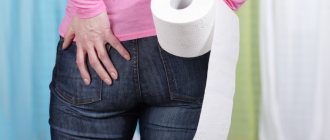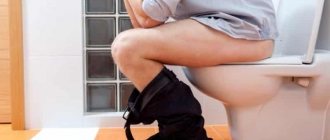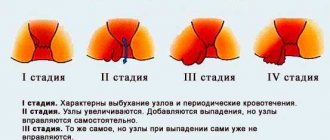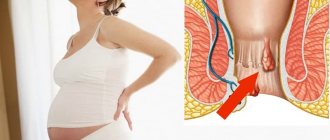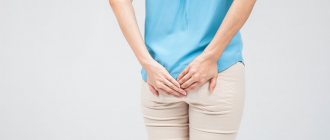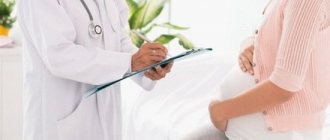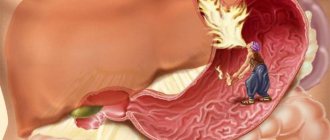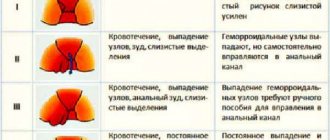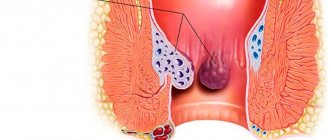Hemorrhoids are a common pathology that occurs in adults. A non-infectious disease that affects the rectum. A proctological disease may not bother a person for a long period, developing gradually and turning into a chronic stage. Such hemorrhoids occur in waves; remissions with periods of exacerbation are possible. When the symptoms subside, the symptoms disappear, and worsening is manifested by intense pain and complications. Therefore, it is important to carry out timely treatment of hemorrhoids during exacerbation, to find suitable methods in the fight against proctological disease.
Causes of exacerbation
The first cause of exacerbation of hemorrhoids is considered to be weakness of the blood walls or venous insufficiency. With a constant influx of a significant amount of blood, the veins in the pelvic area fill and expand, creating hemorrhoidal cones. Often this process does not appear immediately, but gradually. But it also happens that the symptoms of the disease rapidly intensify, leading to a deterioration in the person’s condition.
Basically, hemorrhoids worsen due to the following reasons:
- sedentary lifestyle - if a person sits or stands for a long time, there is a disturbance in blood flow, as a result of which hemorrhoids become overfilled with blood;
- stool disorder - the disease can appear not only in the case of constipation, but also diarrhea. For example, with difficult bowel movements, increased pressure occurs in the middle of the peritoneum, or the mucous membrane is damaged by fecal stones. Watery stools lead to inflammation of the nodes, and pathogenic microorganisms begin to settle in them;
- pregnancy, childbirth - at the moment of bearing a child, the growing fetus begins to compress the veins of the pelvis, causing a change in blood flow, stagnation and difficult bowel movements. Hemorrhoids in women occur during childbirth, the expectant mother pushes, and abdominal pressure increases, causing the lumps to fill with blood;
- poor nutrition – an exacerbation can be triggered by a person eating salty, fried, spicy food or a large amount of sweets, the digestive system is disrupted, constipation appears and blood flow in the pelvis increases;
- Excessive physical activity is considered the main cause of hemorrhoids in men. When lifting weights, muscle tissue is compressed, the veins fill with blood, and then the cavernous formations fall out of the anus.
Often, an attack of hemorrhoids occurs due to psychological factors. The disease intensifies due to stress, depression, and severe mental disorders.
How to prevent exacerbation of chronic hemorrhoids?
The following tips will help you avoid acute hemorrhoids:
- eat properly and balanced;
- give up bad habits, in particular drinking alcohol;
- drink enough pure water without gas and sugar (about 1.5 liters per day);
- avoid excessive physical activity;
- do not lift heavy objects;
- eliminate constipation in a timely manner;
- increase physical activity, especially if your work involves long periods of sitting;
- replace the use of toilet paper after bowel movements by washing with water at room temperature without soap;
- Do gymnastics that strengthens the muscles of the anus.
Thus, we have looked at why hemorrhoids worsen and what to do in this case. We hope our tips will help you. But remember, the sooner you seek qualified medical help, the easier it will be to overcome the disease and avoid life-threatening complications.
Symptoms
Exacerbation of hemorrhoids is manifested by severe symptoms that occur quite quickly. The patient's general condition worsens and he is unable to maintain his previous lifestyle.
The main symptoms of exacerbation of hemorrhoids:
- hemorrhoidal cones come out;
- unbearable pain and inflammation of the rectum;
- signs of intoxication of the body;
- rectal bleeding from the anus;
- increase in body temperature.
The main unpleasant symptom of proctological disease is pain. It occurs instantly after bowel movement, sneezing, coughing. This exacerbation of hemorrhoids lasts several minutes, or even hours.
Often it hurts a person to sit, stand or move. The feeling of pain is so unbearable that psychogenic constipation occurs, the patient does not want to go to the toilet, and his appetite disappears.
The acute stage of hemorrhoids is expressed by bleeding. The blood clots of the hemorrhoids are broken, and the pain is reduced. During this phase, the cones begin to turn blue and become dense. And when they are already quite big, they crawl out. The result is thrombosis, intoxication, and the nodes are pinched.
Symptoms
The clinical manifestation of exacerbation of hemorrhoids, regardless of its type, will be expressed in the following symptoms:
- intense pain syndrome. At first, severe pain will accompany a person only during bowel movements, but as the nodes develop, pain will appear during prolonged sitting or standing, when running or walking quickly. Increased soreness may also occur with sneezing or coughing;
- feeling of discomfort and a foreign object in the anal canal;
- bleeding. This symptom is most typical for the internal localization of cones, but is often observed with external hemorrhoids. The degree of hemorrhage can vary from drops to a stream. In this case, blood will not be present in the stool, but on toilet paper, underwear or a towel;
- swelling and redness of the area around the anus;
- itching and burning;
- the appearance of impurities not only of blood, but also of mucus;
- formation of anal fissures;
- an increase in body temperature – when hemorrhoids are complicated by an inflammatory process;
- cyanosis of the hemorrhoid is a characteristic sign of a complication of the disease such as thrombosis;
- prolapse of internal hemorrhoidal cones, which a person can feel with their fingers. With a mild course of the disease, they can be reduced independently or with the help of fingers, but with a more severe course, they cannot be reduced at all.
Symptoms of exacerbation of hemorrhoids
Individual symptoms of the disease may also be observed in cases of exacerbation of hemorrhoids during menstruation.
In cases where one or more of the above symptoms appear, it is necessary to seek help from a doctor as soon as possible, since aggravated hemorrhoids can cause the development of severe complications.
Many patients are interested in the question: how long does an exacerbation of hemorrhoids last? However, there is no definite answer, since the duration is individual.
Complications
The danger during exacerbation of hemorrhoids is due to the fact that complications may arise:
- Rectal bleeding can be severe, sometimes even independent of bowel movements. This should not be allowed, as acute anemia can occur. Organs feel a lack of oxygen due to a sudden decrease in hemoglobin levels. There is a decrease in blood pressure, pale skin, and malaise.
- Paraproctitis is caused by purulent inflammation of the intestinal tissue. Infection with pathogenic organisms (E. coli, staphylococcus, etc.) is possible. A person feels increasing pain in the posterior canal, lower back, and perineum. There is an increase in temperature, chills occur due to intoxication, which, in turn, is caused by retention of urine and stool. In such situations, surgical assistance will be required.
- Colitis - if hemorrhoids worsen, the pathogenic process can spread to nearby organs, and the mucous membrane of the large intestine can also become inflamed. As a result, the gastrointestinal tract is disrupted, abdominal bloating is noted, spastic pain and flatulence occur.
To avoid complications when hemorrhoids worsen, you should immediately consult a specialist.
First aid
Increased symptoms occur unexpectedly. You can independently provide first aid for exacerbation of hemorrhoids before consulting a doctor by performing the following steps:
- Ice will help relieve aggravation of hemorrhoids. The cold remedy will reduce pain, provoke vasospasm, and stop bleeding.
- Ice suppositories - in the presence of an internal illness. Make them in advance and keep them in the freezer. The tip of the suppository should not be pointed. To perform the manipulation, you need to lie on your side, carefully insert the suppository into the anus, and slightly squeeze the anal sphincter. Keep the product in the rectum for no more than 30 seconds. The method helps reduce the load on the muscle tissue of the anal canal and veins.
- Cool water - it will be more effective if you make a weak solution of potassium permanganate or a herbal decoction, you can add chamomile and calendula. Pour the prepared liquid into a basin and place the anus in it. The duration of the bath is 5 minutes. Hypothermia will have the opposite effect.
- Severely worsened hemorrhoids are treated with painkillers (Relief suppositories, Ultraproct). External nodes are smeared with Ichthyol and Heparin ointment. Medicines normalize venous outflow and help quickly relieve swelling and inflammation of hemorrhoids.
- During exacerbation of hemorrhoids, it is important to empty the intestines daily to prevent the formation of fecal stones. Laxatives (Duphalac, Normaze, Macrogol) will help with this.
- Women during pregnancy are allowed to use suppositories with propolis and belladonna. Suppositories with sea buckthorn oil have a healing effect. External bumps are eliminated using Fleming's ointment.
Laxative medications with irritating effects are not used during an attack of hemorrhoids. Because they will only cause the progression of the disease.
For the same reason, cleansing enemas cannot be performed.
How to relieve exacerbation of hemorrhoids using traditional medicine?
Many patients consider folk remedies safer, and we can agree with this. But you need to understand that, despite their harmlessness, they are not effective enough to completely stop the exacerbation of hemorrhoidal disease, especially in the later stages. Therefore, it is rational to use them only as a complement to the main antihemorrhoidal therapy, if, of course, the treating doctor has approved such treatment.
The safest and most effective are the following folk remedies:
- insertion into the rectum of inserts soaked in sea buckthorn oil;
- lotions on the anus with sea buckthorn oil;
- inserting candles cut from raw potatoes, beets or carrots into the rectal canal before going to bed;
- microenemas. You can make a microenema with vegetable oil, preferably sea buckthorn, decoction or infusion of medicinal plants, for example, wormwood, knotweed, nettle or chamomile;
- sitz baths. In case of exacerbation, which is accompanied by bleeding, baths with cool herbal decoctions will be most effective, and in case of inflammation of acute hemorrhoids - warm or steam baths.
How long does an exacerbation of proctological disease last?
The duration of exacerbation of hemorrhoids mainly depends on the individual characteristics of the person, as well as on:
- intensity of disease symptoms;
- severity of development;
- complications;
- the presence of associated diseases;
- person's age.
In addition, the duration of the course is determined by exactly when the patient consults a doctor. Often the exacerbation lasts 7 days, then the symptoms subside and remission occurs. To achieve this, comprehensive effective methods for treating hemorrhoids are used.
Treatment
After clarifying the diagnosis, the doctor prescribes suitable treatment for exacerbation of hemorrhoids, which can be carried out at home. It includes the use of medications, dietary nutrition, and folk remedies. Prevention of the disease is also important.
Drug treatment
Medicines are prescribed depending on the presence of hemorrhoid symptoms. Since the main symptom is pain, painkillers are used.
Methods of drug therapy for exacerbation are as follows:
- Analgesics (Ketonal, Diclofenac) - NSAID tablets or injections are used with caution, as they reduce blood clotting. The drugs exhibit an analgesic effect, remove swelling and redness.
- Rectal suppositories (for example, Ultraproct, Gepatrombin G) are prescribed as a local effect - they will eliminate pain and improve a person’s well-being.
- Anti-inflammatory local agents (Vishnevsky ointment, Levomekol) - the use of ointment is permissible if the inflammation has spread to tissues and fiber.
- Heparin and Troxevasin ointments are indispensable for thrombosis of hemorrhoidal cones.
- Venotonics (Heparin, Hepatrombin) - promote blood thinning and are aimed at resolving thrombosis.
- Exacerbation of hemorrhoids accompanied by bleeding can be treated with suppositories with adrenaline (Proctosedyl, Methyluracil, Anuzol) - they lead to vasospasm, stopping the bleeding. Hemostatic medications (Adroxon, Spongostan) have the same effect. Itching and burning can be treated with the same means.
- Venotonics (Detralex) - if taken together with topical drugs - the effectiveness of treatment for acute hemorrhoids will increase.
- Relief ointments and suppositories help to cope with anal fissures. It contains natural substances with a strong wound healing effect. Sea buckthorn suppositories are excellent for healing wounds, and belladonna suppositories relieve pain.
- Antibiotic therapy (Olestesin, Levomekol, Tetracycline) is used for the treatment of acute, chronic hemorrhoids, which are accompanied by the presence of purulent discharge from the anus and an increase in body temperature.
Comprehensive established treatment of hemorrhoids at home will show a positive and quick result, however, with advanced hemorrhoids, surgery cannot be avoided.
Diet
Hemorrhoids can worsen due to poor nutrition. At the time of remission, a person is allowed to consume a few prohibited foods, but during an exacerbation, a strict diet will be required.
Nutrition for exacerbation of hemorrhoids is as follows:
- in the first days of an attack, you should unload the intestines using only water, herbal infusions or green tea;
- gradually introduce porridges containing plant fiber into the diet;
- It is recommended to eat a lot of fruits and vegetables, they will help prevent constipation;
- Fermented milk products, mainly with live lactobacilli, have a positive effect on the digestive tract;
- At night you can consume no more than 1 tablespoon of vegetable oil. This will help you go to the toilet with ease in the morning;
- When you wake up, first drink a glass of water, and throughout the day - at least 2 liters.
Remove from the diet:
- alcohol;
- spicy, fatty, fried foods;
- smoked meats, marinades, preserves;
- sauces, seasonings;
- milk.
Only with a healthy diet is it possible to get rid of or prevent worsening of hemorrhoids.
Disease prevention
Even after treatment, it is necessary to follow basic rules of prevention. This is a set of recommendations: morning exercises, exercises for the outflow of blood from the lower body, adequate fluid intake, a ban on alcohol, prevention of constipation, and the absence of fried, spicy and salty foods in the diet.
Is it possible to play sports when the disease appears? It is better to postpone the event until all symptoms disappear. All types of strength exercises, horse riding, and weightlifting are strictly prohibited.
Exacerbation of chronic hemorrhoids is a signal to contact an experienced specialist. Only a doctor can quickly relieve pain symptoms by choosing the right treatment regimen.
Important
